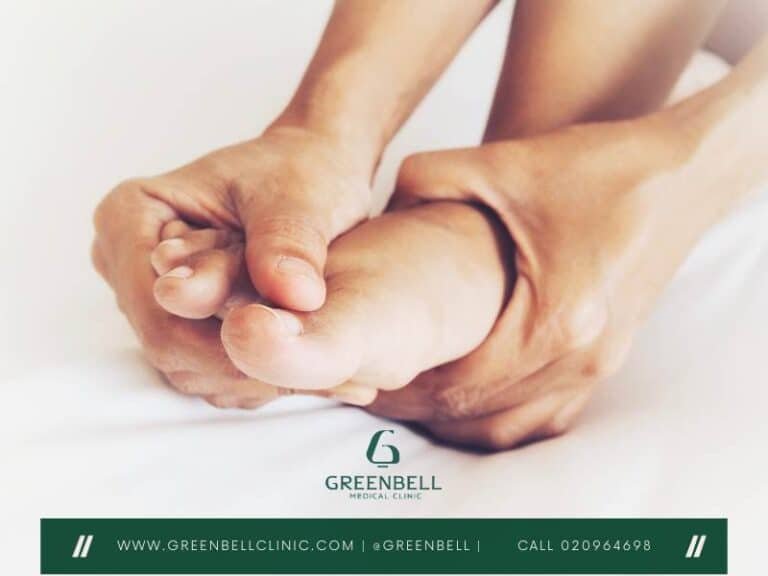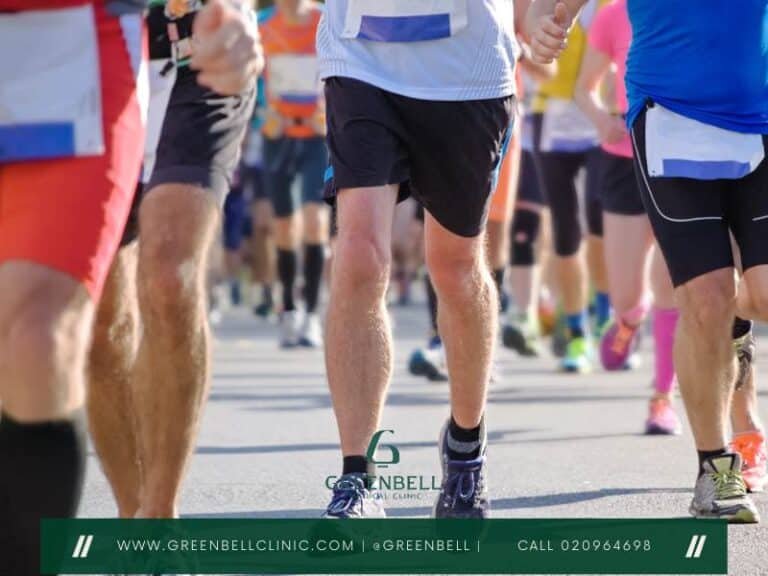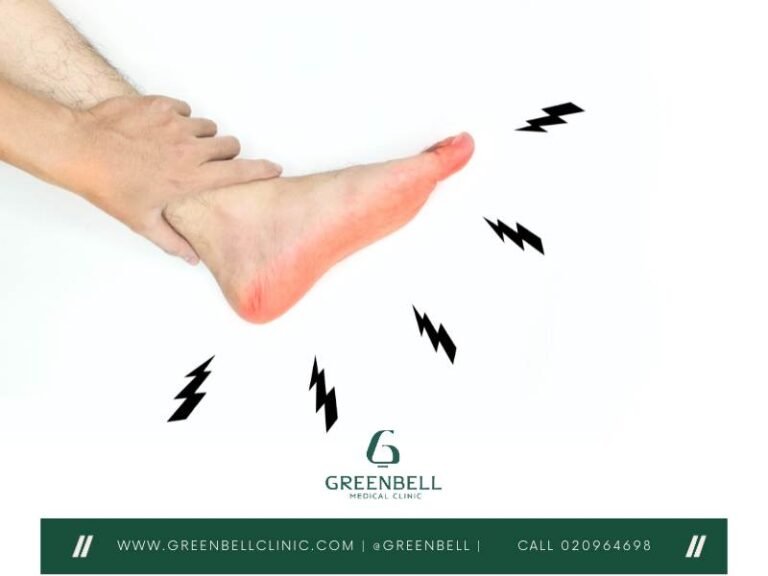Many runners have felt the odd feeling of numb feet during their runs. This can be a tingling or a complete loss of feeling. Foot numbness is not just uncomfortable; it can also be a safety risk. In this article, we’ll look at why this happens and how to fix it.
We’ll talk about things like bad shoes and running too much. We’ll show you what causes foot numbness and how to spot the signs. Knowing the causes helps you avoid and fix this issue. This way, you can enjoy running more and stay safe.

Key Takeaways
- Discover the common causes of numb foot running, including ill-fitting shoes and overtraining
- Learn how to identify the signs and symptoms of foot numbness during your runs
- Explore effective solutions to prevent and manage numb feet, such as proper shoe fitting and gradual mileage increase
- Understand the importance of seeking medical advice for persistent or severe foot numbness
- Discover innovative treatments like physical therapy and peripheral magnetic stimulation to address running-induced foot neuropathy
Understanding Foot Numbness During Running
Running is both exciting and rewarding, but it has its challenges. One common issue is foot numbness, known as running foot paresthesia or running foot neuropathy. This can make running uncomfortable and affect performance and well-being.
Foot numbness often comes from the feet’s repetitive stress, shoes that don’t fit well, and some neurological conditions. When nerves in the feet get compressed or irritated, they can cause a tingling or numb feeling. This is known as toenail numbness from running.
It’s important for runners to know why this happens to keep enjoying their sport. By fixing the root causes and taking steps to prevent it, runners can run without feeling numb or tingly in their feet.
“Foot numbness can be a frustrating and persistent problem for many runners, but it doesn’t have to be a deal-breaker. With the right knowledge and strategies, runners can take steps to overcome this challenge and continue pursuing their fitness goals.”
We’ll now look into why running makes feet numb, what signs to watch for, and how to prevent and treat it.
Common Causes of Running-Induced Foot Numbness
Runners often face the issue of numb feet during or after a workout. This problem, known as “running-induced foot numbness,” can be annoying. Knowing what causes it can help us fix it and stop it from happening. Ill-fitting running shoes and overtraining are the main reasons for this issue.

Ill-Fitting Running Shoes
Wearing shoes that don’t fit well is a big reason for numb feet. Shoes that don’t fit right make your feet slide and put pressure on the nerves. This can make your toes tingle or feel numb. To stop this, get good quality running shoes that fit well and support your feet.
Overtraining or Excessive Mileage
Running too much or too fast can also cause numb feet. The constant pounding can stress your foot nerves, making them numb. To avoid this, slowly increase your running and give your body time to recover between workouts.
By fixing these two main causes, you can lessen the numbness and make running more enjoyable.
Numb Foot Running: Identifying the Signs
As a runner, knowing the signs of foot numbness is key. It can affect your performance, safety, and health. Numb foot running and foot numbness during running show up in different ways. Spotting these symptoms early can help you fix the problem fast.
A common sign is feeling tingling or “pins and needles.” This can feel like a prickling or burning in your toes, foot sole, or the whole foot. Some runners might also notice their toenails feel less sensitive.
- Tingling or “pins and needles” sensation in the toes, sole, or entire foot
- Toenail numbness
- Decreased sensation or feeling of “walking on air”
Another clue is feeling less sensation or like you’re walking on air. This can make it hard to know where your foot is, leading to balance problems and a higher injury risk.
“Recognizing the early signs of foot numbness is key to addressing the issue before it becomes a more serious problem.”
If you notice these symptoms while running, act fast to find the cause. Being proactive and knowing the signs of numb foot running and foot numbness during running helps you keep running well.
Tingling Feet and Pins and Needles: A Runner’s Dilemma
Runners often face the issue of tingling feet or feeling “pins and needles.” This is known as running foot paresthesia. It can come from different neurological conditions that affect how your feet feel during exercise.

Neurological Conditions Affecting Foot Numbness
Peripheral neuropathy is a common cause of foot numbness and tingling. It happens when nerves that carry signals between the brain and body get damaged. Runners with this condition might notice:
- Tingling or burning sensations in the feet
- Numbness or loss of sensation in the feet
- Increased sensitivity to touch or temperature
- Muscle weakness or uncoordination
Tarsal tunnel syndrome is another condition that can cause foot numbness. It happens when the tibial nerve in the ankle gets pinched. Runners with this issue might feel:
- Tingling or burning sensations in the sole of the foot
- Numbness or weakness in the foot and ankle
- Pain or discomfort when walking or running
Runners should know about these conditions and see a doctor if they have ongoing or getting worse numbness, tingling, or other strange feelings.
Running Foot Paresthesia: When to Seek Medical Advice
If you’re a runner and feel constant or severe foot numbness, you should get medical help. This issue, also called running foot neuropathy, might show a deeper problem that needs a doctor’s check-up and treatment.
Feeling numbness in your feet while or after running is common. It usually comes from nerve compression or irritation. But if this numbness, along with tingling or losing feeling in your feet, lasts more than a few minutes after running, see a doctor. This could be a sign you need to see a podiatrist or neurologist.
Recognizing the Need for Medical Intervention
- Recurring or worsening foot numbness during or after running
- Numbness that lasts for more than a few minutes after a run
- Sudden or unexplained changes in foot sensation or mobility
- Difficulty with balance or coordination while running
- Pain, swelling, or discoloration in the affected foot
A healthcare provider will check you out, might order tests like X-rays or MRI, and could do nerve tests. This helps figure out why you’re feeling numb in your feet. They’ll look for any problems with your body’s structure, nerves, or blood flow.
Getting medical advice quickly can help fix the real cause of your foot numbness. You’ll get a plan to manage it and stop it from getting worse. This might mean changing how you train, wearing special shoes, doing physical therapy, or other treatments to help your nerves work right again.
Preventing Foot Numbness During Training
As avid runners, we know the frustration of dealing with foot numbness during our training sessions. Fortunately, there are steps we can take to prevent this issue. These steps help keep our feet healthy and responsive throughout our runs.

Proper Shoe Fitting and Replacement
The key to preventing numb foot running is wearing the right running shoes. Make sure your shoes fit well but not too tightly. Replace them every 300-500 miles to keep the cushioning and support good. A professional shoe fitting can help find the perfect pair to address foot numbness during running.
Gradual Mileage Increase and Recovery
Increasing your training too quickly can lead to overuse injuries, including numb foot running. Increase your mileage by no more than 10% each week. Also, make sure to include enough recovery time between runs. This helps your nerves and muscles adjust to the increased stress, lowering the risk of foot numbness during running.
By following these simple steps, you can greatly reduce the chance of numb foot running. This way, you can enjoy a more comfortable, pain-free training experience. Remember, how physio helps with these issues is also key in keeping foot health and preventing future numbness.
Treating Numb Toes from Running
Runners often face numb toes or feet falling asleep during their runs. There are several ways to fix this issue. One good method is to add foot stretches and massages to your routine. These exercises boost circulation and lessen numbness.
Using compression socks or sleeves is also a great idea. These items put gentle pressure on the feet and lower legs. This pressure helps blood flow better and stops fluid from pooling, which can cause numbness. Wearing these during and after runs can greatly improve your foot comfort.
If you have numb toes often, getting advice from a professional might help. A physical therapist or podiatrist can check what’s causing the problem. They can then suggest exercises, orthotics, or changes to how you run.
Dealing with numb toes is important for your comfort and safety while running. By improving foot circulation and reducing numbness, you can make running more enjoyable. Taking steps to fix this issue can make a big difference.
Running Foot Neuropathy: Exploring Treatment Options
Runners with running foot neuropathy need effective treatments to manage symptoms and prevent nerve damage. Physical therapy and stretching exercises have shown to be helpful.

Physical Therapy and Stretching Exercises
A good physical therapy program can tackle the causes of running foot neuropathy and bring relief. Physical therapists assess the condition and create a plan just for you. This plan might include:
- Nerve-specific stretching and mobilization techniques to reduce compression and improve nerve gliding
- Strengthening exercises to support the foot and ankle muscles, enhancing stability and reducing strain on the nerves
- Balance and proprioception training to improve overall foot and ankle function
- Soft tissue massage to alleviate muscle tension and improve circulation
Through physical therapy and specific stretches, runners can see big improvements in symptoms. This reduces the risk of nerve damage. Regular check-ins with a physical therapist help track progress and adjust the plan as needed.
Adding how physio helps with running-induced foot numbness to your routine can greatly benefit athletes. It helps them stay active without foot problems.
How Physio Helps with Running-Induced Foot Numbness
If you’re a runner dealing with foot numbness, a physiotherapist can help. They know how to find and fix the causes of running-induced foot numbness. They create special plans to help you feel better.
First, a physiotherapist will check your running style, shoes, and muscle balance. Then, they’ll make a detailed plan to fix the numbness.
Targeted Exercises and Stretches
Physiotherapists help with foot numbness by giving you exercises and stretches. These can include:
- Strengthening the intrinsic foot muscles for better stability
- Stretching tight calf muscles and Achilles tendons to ease nerve pressure
- Improving ankle mobility for better foot movement
Gait Analysis and Correction
Physiotherapists are great at checking how you run and finding ways to improve. They’ll look at your running style and suggest changes. This can help fix your foot numbness.
Manual Therapy and Modalities
Physiotherapists also use hands-on treatments and special tools. These can be soft tissue mobilization or joint work. They might also use electrical stimulation or ultrasound to lessen swelling and help healing.
Working with a physiotherapist helps runners understand why they have foot numbness. Together, you can make a plan to manage and stop this issue.
Peripheral Magnetic Stimulation: A Novel Approach
Runners often face the issue of foot numbness. A new treatment option is peripheral magnetic stimulation. It’s non-invasive and could help with tingling and loss of sensation.
This method targets nerves in the feet with electromagnetic pulses. These pulses aim to improve nerve function. This could lessen foot numbness and neuropathy symptoms. It’s a good choice for runners who don’t want invasive treatments.
The research on this method is still new but looks promising. Studies suggest it can boost sensation, cut down pain, and improve foot function. Runners might soon have a new way to deal with numb feet.
If you’re looking for a non-drug, non-surgical way to fix foot numbness from running, consider this. Always talk to a doctor to see if it’s right for you. With the right advice, runners could find relief from this annoying issue.
Feet Falling Asleep While Running: Staying Alert and Safe
Running is a great way to stay healthy, but it has its challenges. Runners often face the issue of their feet falling asleep. This is called “foot paresthesia” and can be a big safety risk.
Feeling your feet fall asleep can make it hard to control your movements. This can lead to poor running form and balance issues. It also raises the chance of getting hurt and makes it tough to see what’s ahead.
To stay safe and alert, runners should try these tips:
- Adjust their running form: Focus on how you land and move your feet to keep blood flowing well.
- Take regular breaks: Stop to stretch and move your toes to help them wake up.
- Be mindful of their surroundings: Keep an eye on the path and watch out for dangers.
If feet keep falling asleep and it’s a big problem, see a doctor. They can help figure out why and find a solution. This can make running safer and more fun.
| Causes of Feet Falling Asleep While Running | Solutions |
|---|---|
|
|
By taking action and using these tips, runners can handle the issue of feet falling asleep. This makes workouts safer and more enjoyable.
Conclusion
This article has covered the main reasons for numbness in the foot while running. We talked about how things like bad shoes and running too much can cause it. We also looked at ways to stop and fix this problem.
Now, runners in Thailand know what to watch for and how to treat numbness in their feet. They can try physical therapy or magnetic stimulation. This helps them keep running well and enjoy it more.
By following the advice in this article, runners can keep their performance up and have fun. They should pick the right shoes and increase their running slowly. If they need help, they should get advice from a doctor.
It’s important to deal with numb foot running early to make sure running stays safe and fun. By being informed and acting quickly, runners can beat this issue. This way, they can keep loving their sport.





